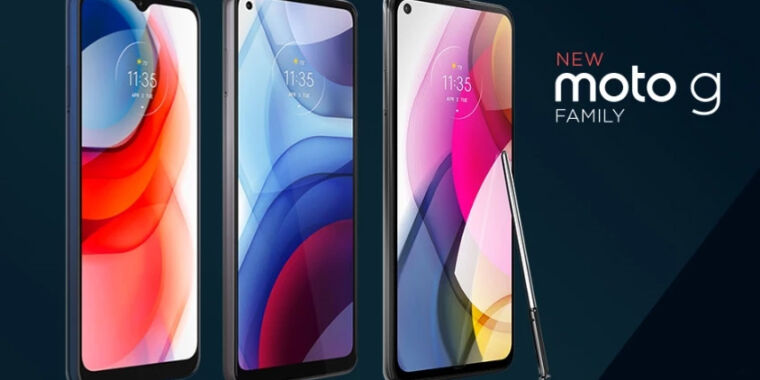
-
The Moto G Play (2021), for $170. There’s a rear fingerprint reader, a top headphone jack, and a teardrop front camera mount.
-
The $200 Moto G Power, which goes with a hole-punch camera, and a side fingerprint reader.
-
The $300 Moto G Stylus, which has another side fingerprint reader.
-
The Moto G Stylus houses a stylus.
-
The Motorola One Ace 5G ? Ace 5G One? Something like that. It’s $400.
Motorola has announced most of its 2021 lineup all at once, so we have a big pile of phones to sift through. Meet the Moto G Play (2021), Moto G Power (2021), Moto G Stylus (2021), and Motorola One 5G Ace. These names all really roll off the tongue.
There’s no way we’re making sense of this without a big table, so here we go:
| Moto G Play (2021) | Moto G Power (2021) | Moto G Stylus (2021) | Motorola One 5G Ace | |
|---|---|---|---|---|
| STARTING PRICE | $169.99 | $199.99 / $249.99 | $299.99 | $399.99 |
| SCREEN | 6.5-inch 1600×720p LCD | 6.6-inch 1600×720p LCD | 6.8-inch 2400×1080 LCD | 6.7-inch 2400×1080 LCD |
| CPU | Snapdragon 460 (Four 1.8GHz Cortex A73 cores, four A53 cores, 11nm) |
Snapdragon 662 (Four 2GHz, Cortex A73 cores, four A53 cores, 11nm) |
Snapdragon 678 (two 2.2GHz Cortex A76 cores, six A53 cores, 11nm) |
Snapdragon 750G 5G (two Cortex 2.2GHz A77 cores, six A55 cores, 8nm) |
| RAM | 3GB | 3GB or 4GB | 4GB | 6GB |
| STORAGE | 32GB | 32GB or 64GB | 128GB | 128GB |
| CAMERA | 13MP Main 2MP Depth 5MP Front |
48MP Main 2MP Depth 2MP Macro 8MP Front |
48MP Main 8MP Wide Angle 2MP Macro2MP Depth 16MP Front |
48MP Main 8MP Wide Angle 2MP Macro 16MP Front |
| PORTS | USB-C, headphone jack | |||
| BATTERY | 5000mAh | 5000mAh | 4000mAh | 4000mAh |
| NFC | No | No | No | Yes |
If we compare this to last year’s lineup that was announced around this time, the cheapest phone used to be the $150 Moto E (2020) and now it’s the Moto G Play (2021) at $170. That extra $20 includes a big battery upgrade from 3550mAh to 5000mAh, an extra GB of RAM, and an upgrade from Micro-USB to the modern world of USB-C. Everything has a big 5000mAh battery other than the Moto G Stylus, which has to carve out some space for storage of the eponymous stylus.
The Play, as the cheapest phone, has a teardrop front camera and thicker bezels. The Power and Sylus have hole-punch cameras in the top left corner of the display, while the One 5G Ace has a centered hole-punch camera. Everything has a headphone jack, a MicroSD slot and a fingerprint reader, either rear or side mounted.
If you care about 5G, and you should not, the Motorola One 5G Ace is a pretty cheap entry point to the world of overhyped smartphone connectivity. There are crazy-cheap 5G devices in China for ~$150, but for many territories, this $400 device will be the cheapest 5G device on the market. It’s only sub-6GHz 5G, not the faster mmWave used in all the carrier marketing, but the carriers are hoping you won’t notice.
These Motorola devices are all shipping with the out-of-date Android 10, and Motorola has one of the worst update promises in the industry, which is typically one major update and only bi-monthly security updates for two years. Motorola is also still totally out to lunch when it comes to NFC, which doesn’t enter the lineup until you hit $400. Compare this to something like HMD’s Nokia lineup, which offers NFC starting on the $180 Nokia 3.4.
We’re viewing this all from a distance right now, but it’s tough to find a spot for Motorola in the market given those problems. Neither the $300 Stylus or the $400 One 5G Ace seem like they could stand up to the might of the $350 Google Pixel 4a, which will surely wipe the floor with Moto when it comes to performance, camera quality, and updates. Below that there is some space for the G Power and Play, but now OnePlus is heating up that price point with a 90Hz, $180 phone, the OnePlus Nord N100. Like Motorola, OnePlus’ “Android 11 only” update plan is terrible, but maybe that’s something you’re willing to sacrifice at this price point. Everything from Nokia is also worth looking at, thanks to the inclusion of stock Android, two years of major updates, and monthly security updates for three years. The only thing on these phones that stands out from the $180 Nokia 3.4 or $200 Nokia 5.3 is the 5000mAh battery, but you’ve got to trust that Motorola’s software won’t just chew that up.
If you’re interested in Motorola’s lineup, all four phones are launching January 14 in the US at all the major retailers like Best Buy, Walmart, and Amazon. What seems like Motorola’s real business, pre-paid phone carriers, are also lining up to shovel out the hardware, with the company saying flagging “AT&T, Cricket, Boost Mobile, Consumer Cellular, Google Fi, Metro by T-Mobile, T-Mobile, Republic Wireless, Verizon and Xfinity Mobile” as partners.
https://arstechnica.com/?p=1733882

